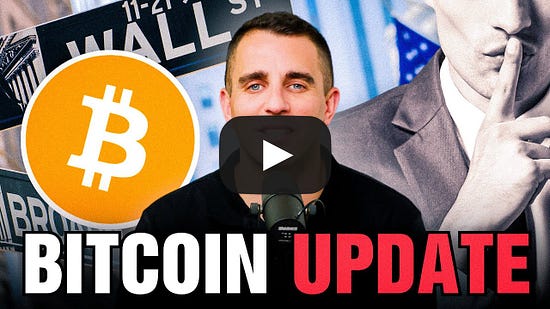|
To investors,
PayPal published a new policy towards the end of last week that was set to go into practice in November. Companies do this all the time and there is never any fanfare. But this policy update was quite different.
PayPal explicitly stated that they would target anyone “sending, posting, or publication of any messages, content, or materials” that “promote misinformation.” How would they do this? The company would deduct $2,500 from your PayPal account if they deemed you were in violation.
Unbelievable.
To ensure that we have no misunderstanding here, let me break this down in the most simple terms. A private company was prepared to financially penalize their customers if they posted any message on the internet that the company believed was “misinformation.”
Naturally, the internet had a field day with this. The backlash was loud and swift. Everyone from Elon Musk to former PayPal President David Marcus spoke out against this egregious encroachment on personal freedom, individual liberties, and free speech.

This kind of lunacy from a corporation reminded me of the George Orwell line from 1984:
“The ideal set up by the Party was something huge, terrible, and glittering—a world of steel and concrete, of monstrous machines and terrifying weapons—a nation of warriors and fanatics, marching forward in perfect unity, all thinking the same thoughts and shouting the same slogans, perpetually working, fighting, triumphing, persecuting—three hundred million people all with the same face.” - George Orwell
The beauty of America, and humanity at large, is that we all think different ideas. We question the status quo. People used to think that the Earth was flat and some individuals who spoke out against the idea were killed. People used to think it was perfectly fine for medical staff to refrain from washing their hands between seeing different patients in hospitals. People used to think that the light bulb could kill them.
None of those ideas remain today because someone was willing to think differently. Someone was willing to ignore the talking points. They were willing to run the experiments, pursue the scientific method, or ask questions until they were satisfied.
While PayPal may be the first private company to float this idea (which they are now claiming was by accident (lol) and never intended to have published), there are plenty of dictators of the past who wished they could have this type of control. Back to Orwell:
“By comparison with that existing today, all the tyrannies of the past were half-hearted and inefficient…Part of the reason for this was that in the past no government had the power to keep its citizens under constant surveillance. The invention of print, however, made it easier to manipulate public opinion, and the film and the radio carried the process further.” - George Orwell
Technology has been a very large net positive for humanity. It has led to incredible economic prosperity and progress. But it has also created an environment which allows technology companies, and governments, to violate the rights of the individual. It positions the everyday citizen at a disadvantage when companies want to do dumb things like this “misinformation” proposal.
It is during these times that we must remember that there is a better way. The world doesn’t have to end in surveillance, censorship, and dictatorships. Freedom is a viable option. Orwell pointed this out as well:
“To the future or to the past, to a time when thought is free, when men are different from one another and do not live alone—to a time when truth exists and what is done cannot be undone: From the age of uniformity, from the age of solitude, from the age of Big Brother, from the age of doublethink—greetings!” - George Orwell
The PayPal news was a good reminder that weird, nasty things are on the horizon. There will be more proposals around combatting “misinformation.” It reminds me of the use of the term “terrorism” or “insurgent.” For nearly 20 years, almost anything was fair game for a government to do if they were doing it in the name of stopping terrorism. The same thing will be true for misinformation for the next 20 years.
Private companies and governments are going to try a lot of things. The individuals will only be able to resist these overreaches if they are willing to band together and speak out. That is what happened over the weekend. PayPal quickly backpedaled. It didn’t come without cost though - many of my friends deleted their accounts already.
The scariest situation wasn’t even the PayPal proposal though.
Take the idea of PayPal’s banking authorization. They are allowed to debit your bank account, so if you had $0 in your PayPal account and this policy had been put into action, does that mean PayPal could have deducted $2,500 out of your personal bank account if they didn’t like something you said on the internet? That sounds horrific.
No thank you.
The second situation is central bank digital currencies (CBDCs). What happens when it isn’t a company with these capabilities, but rather a government? It is likely to be a real scenario if CBDCs gain mainstream adoption. That is a slippery slope with unclear guardrails, which historically has led to far overreaches that are later regretted.
PayPal just rang the alarm bell. We must proceed with caution. No one wants malicious market participants openly sharing known false information to the detriment of innocent people. But there are quite a number of organizations claiming that information is known and/or accurate, which later turns out to not be the case.
We have to encourage the questioning of authority. In fact, Benjamin Franklin said “It is the first responsibility of every citizen to question authority.” We have to understand that truth is not decreed from mountain tops, but rather it is discovered from rigorous evaluation and relentless testing. Social media has optimized our world around speed and decisiveness, which can have its advantages in certain situations, but that doesn’t necessarily ensure we always get the right answers on the first few tries.
Things are getting weirder. We must continue to hold curiosity and skepticism in high regard. We probably don’t want corporations or governments regulating what everyday citizens say on the internet outside of the extreme cases (encouraging violence, etc). This whole sector is going to be worth paying attention to in the coming years. If we aren’t careful, we won’t even be able to talk about it by then.
Hope you all have a great day. I’ll talk to everyone tomorrow.
-Pomp
SPONSORED: AG1 by Athletic Greens is the single best option for easy optimal nutrition. Not only do I take AG1 every day, but I liked the product so much I became an investor in the business.
AG1 delivers 75 vitamins, minerals and whole-food sourced nutrients. That’s the equivalent of 9 other products: your probiotic, your multivitamin, your daily supplement (you get the picture)—all in a single serving that you mix with water. If you’re looking to fill nutritional gaps and have more energy, it’s an absolute no-brainer.
Braeden Anderson is an Attorney at Kirkland & Ellis and Author of the book "Black Resilience".
In this conversation, Braeden gives us the latest updates on regulation in the crypto space and when we might see progress on these important decisions. We also discuss Braeden's background and his tough upbringing that led him to become the success he is today.
Listen on iTunes: Click here
Listen on Spotify: Click here
Earn Bitcoin by listening on Fountain: Click here
Weekly Bitcoin Recap

Podcast Sponsors
These companies make the podcast possible, so go check them out and thank them for their support!
Alto IRAcan help you invest in crypto in tax-advantaged ways to help preserve your hard earned money. There are no setup or account fees, and it’s all you need to do to invest in crypto tax free. Open an Alto CryptoIRA to invest in crypto tax-free by clickinghere.
Eight Sleep is the most advanced solution on the market for thermoregulation by pairing dynamic cooling and heating with biometric tracking. Click here to check out the Pod Pro Cover and save $150 at checkout.
FTX US is the safe, regulated way to buy digital assets. Trade crypto with up to 85% lower fees than top competitors by signing up at FTX.US today.
Amberdata provides the critical data infrastructure enabling financial institutions to participate in the digital asset class. We deliver comprehensive data and insights into blockchain networks, crypto markets, and decentralized finance. Download our Digital Asset Data Guide here today.
SiGMA is the bridge between iGaming, online sports betting, and emerging technology, such as Blockchain, NFTs, fintech, GameFi, metaverse, and AI, is loud and clear. The largest global summit of this kind is heading to Malta from November 15 to 17. Log on to AIBC.WORLD or SiGMA.WORLD to see all our upcoming global summits!
Bullish is a powerful exchange for digital assets that offers deep liquidity, automated market making, and industry-leading security. Click here to learn more.
Valour represents what’s next in the digital economy -- providing simplified, trusted access to crypto, decentralized finance and Web 3.0 investment opportunities. For more information visit valour.com
Unstoppable Domains’ 10 NFT domain endings are now fully integrated with Trust Wallet. Claim your Unstoppable Domainhere today.
Compass Mining is the world's first online marketplace for bitcoin mining hardware and hosting. Visit compassmining.io to start mining bitcoin today!
LMAX Digitalis the market-leading solution for institutional crypto trading & custodial services. Learn more at LMAXdigital.com/pomp
Exodus is the world’s leading desktop, mobile, and hardware crypto wallets, with over 150 assets. Founded in 2015 to empower people to control their wealth. Visit http://exodus.com/pomp today.
You are receiving The Pomp Letter because you either signed up or you attended one of the events that I spoke at. Feel free to unsubscribe if you aren’t finding this valuable. Nothing in this email is intended to serve as financial advice. Do your own research.
You’re a free subscriber to The Pomp Letter. For the full experience, become a paid subscriber.


